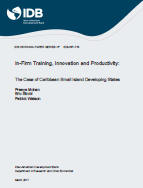In-Firm Training, Innovation and Productivity: The Case of Caribbean Small Island Developing States
Date
Mar 2017
In-firm training is a crucial innovative activity in modern knowledge-based economies which face increasing global competition and rapidly changing technology. Nevertheless, there are few studies which look at in-firm training in the Caribbean. This study uses the World Bank Enterprise Survey (WBES) 2010 and Compete Caribbean's Productivity Technology Innovation Survey (PROTEqIN) 2014 to provide empirical evidence on in-firm training in the region. The results suggest that there is a relatively low incidence of training in the region, although there are significant differences across countries and this may be because of heterogeneities in public support and barriers to in-firm training. Also, various firm characteristics affect in-firm training, including size, ownership, whether the firm exports, whether the firm is part of a larger organization, innovative activity and workforce structure and educational level. Lastly, the findings suggest that in-firm training in the region may play a relatively small role and may not even matter for innovation and productivity.



